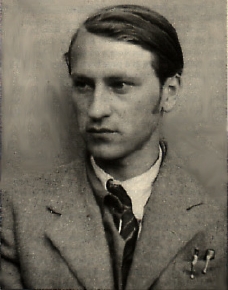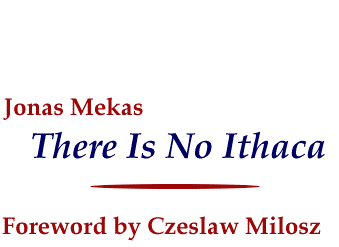

 |

|

Mekas
How many Europeans have lost their homelands in this turbulent twentieth century? Millions, and there seems to be no end to the condition of uprootedness, as the fate of Bosnia testifies. Those who become exiles lose not only their possessions. Trees, meadows, fields as seen in their childhood are taken from them. And yet, if they write about their lost countries, they are, in a way, privileged, and I am going to explain why, upon the example of Jonas Mekas' poems.
Mekas found himself during the Second World War as a slave laborer in Germany. He was young, he survived. After the war, he shared the fate of many Displaced Persons who continued to live in Germany because their countries were overrun by the Red Army. In a Displaced Persons' camp he was writing poems about his lost Lithuania. His native village and four seasons, each with its labors in the fields and joys were his subject. Here we come to a secret of poetry written in exile. To be good, it has to make use of something going deeper than nostalgia. And that something is the power of distance.
"Distance is the soul of beauty." This sentence of Simone Weil expresses an old truth: only through a distance, in space or in time, does reality undergo purification. Our immediate concerns which were blinding us to the grace of ordinary things disappear and a look backward reveals them in their every minutest detail. Distance engendered by the passing of time is at the core of the oeuvre of Marcel Proust. Distance in space and awareness that borders with their barbed wire separated him from his country allowed a young Lithuanian to write his Idylls. In a way his poems follow the model of a poem on the four seasons, The Year, by an eighteenth century Lithuanian poet, Kristijonas Donelaitis. Yet they have the warmth of the direct recollections of the author's childhood and adolescence in the house of his parents. It is good that Idylls, called by historians of Lithuanian poetry the best poetic work by Jonas Mekas, appear now in English translation. Mekas has been recently honored in America and France as a promoter of avant-garde cinema, of a movement created by independent film-makers, which, though marginal as compared with Hollywood, is seminal for the future of film art. His sensitivity to unrepeatable light, color, scents of his native region, in the north of Lithuania, as shown in Idylls is that of a visionary who lifts the most earthly details of reality to a higher level of intensity: this explains why he is both a poet and a poet of things observed and preserved on the film reel.